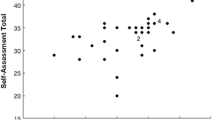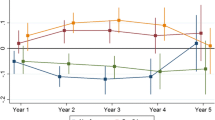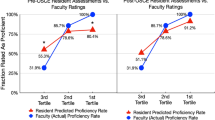Abstract
Some researchers have seen the capacity for self-assessment in trainees as a special skill, and some reports have concluded that this skill is positively and crucially correlated with academic competence. Thus, it is believed that those trainees who are most deficient in knowledge are least likely to be aware of their limitations. Other researchers have emphasized the impact of statistical regression and other technical considerations in the studies, which have led to these conclusions. Our study used a relative-ranking design to measure the accuracy of self-assessments of both strengths and weaknesses in psychiatry residents. We analyzed the relationships between indices of self-assessment accuracy and other resident characteristics, particularly current academic strength as measured by a standard test of psychiatric knowledge. A total of 56 residents in two general psychiatry programs evaluated their performance on the Psychiatry Resident in Training Examination by estimating the rank order of their scores in the 11 psychiatry subject areas. For each resident, actual examination results were then used to generate measures of the accuracy of the identification of strengths and weaknesses. Residents’ identifications of their strengths and weaknesses were significantly more accurate than chance levels. Strengths and weaknesses were identified with roughly equal proficiency, and accuracy in these assessments was not correlated to any of the following variables: academic competence as measured by examination raw scores, postgraduate year, gender, international vs. American medical education, program membership, or age. Our results do not support the hypothesis that trainees who show the least academic mastery also make the most inaccurate self-assessments. In addition, we found no resident characteristics that accounted for variation in self-assessment accuracy.
Similar content being viewed by others
References
Baliga, S., Gruppen, L.D., Fitzgerald, J.T., White, C., Grum, C.M., Woolliscroft, J.O. & Davis, W.K. (1998). Do personal characteristics influence self-assessment accuracy? Paper presented at the 8th International Ottawa Conference on Medical Education, Philadelphia.
J.T. Fitzgerald L.D. Gruppen C.B. White (2000) ArticleTitleThe influence of task formats on the accuracy of medical students’ self-assessments Academic Medicine 75 737–741
M.J. Gordon (1991) ArticleTitleA review of the validity and accuracy of self-assessments in health professions training Academic Medicine 66 762–769 Occurrence Handle10.1097/00001888-199112000-00012
L.D. Gruppen J. Garcia C.M. Grum J.T. Fitzgerald C.A. White L. Dicken J.C. Sisson A. Zweifler (1997) ArticleTitleMedical students’ self-assessment accuracy in communication skills Academic Medicine 72 IssueID10 suppl S57–S59
L.D. Gruppen C. White J.T. Fitzgerald C.M. Grum J.O. Woolliscroft (2000) ArticleTitleMedical students’ self-assessments and their allocations of learning time Academic Medicine 75 374–379
J.P. Harrington J.J. Murnaghan G. Regehr (1997) ArticleTitleApplying a relative ranking model to the self-assessment of extended performances Advances in Health Sciences Education 2 17–25
G. Hodges G. Regehr M. Martin (2001) ArticleTitleDifficulties in recognizing one’s own incompetence: Novice physicians who are unskilled and unaware of it Academic Medicine 76 IssueID10 suppl S87–S89
J. Kruger D. Dunning (1999) ArticleTitleUnskilled and unaware of it: How difficulties in recognizing one’s own incompetence lead to inflated self-assessments Journal of Personality and Social Psychology 77 1121–1134
J. Krueger R.A. Mueller (2002) ArticleTitleUnskilled, unaware, or both? The better-than-average heuristic and statistical regression predict errors in estimates of own performance Journal of Personality and Social Psychology 82 180–188 Occurrence Handle10.1037//0022-3514.82.2.180
G. Regehr B. Hodges R. Tiberius J. Lofchy (1996) ArticleTitleMeasuring self-assessment skills: An innovative relative ranking model Academic Medicine 71 IssueID10 suppl S52–S54
H.I. Reiter K.W. Eva R.M. Hatala G.R. Norman (2002) ArticleTitleSelf and peer assessment in tutorials: Application of a relative-ranking model Academic Medicine 77 1134–1139
M. Ward L. Gruppen G. Regehr (2002) ArticleTitleMeasuring self-assessment: Current state of the art Advances in Health Science Education 7 63–80
Author information
Authors and Affiliations
Corresponding author
Rights and permissions
About this article
Cite this article
Lynn, D.J., Holzer, C. & O’Neill, P. Relationships Between Self-Assessment Skills, Test Performance, and Demographic Variables in Psychiatry Residents. Adv Health Sci Educ Theory Pract 11, 51–60 (2006). https://doi.org/10.1007/s10459-005-5473-4
Received:
Accepted:
Issue Date:
DOI: https://doi.org/10.1007/s10459-005-5473-4




